Analysis of ADR Strengths and Weaknesses in Dispute Resolution
VerifiedAdded on 2021/06/15
|13
|3265
|81
Essay
AI Summary
This research paper provides a comprehensive analysis of Alternative Dispute Resolution (ADR), examining its various processes, including arbitration, mediation, negotiation, and others. The paper explores the advantages of ADR, such as flexibility, cost-effectiveness, and time savings compared to traditional litigation. It delves into the strengths of ADR, highlighting factors like party control over the process, confidentiality, and reduced stress. Conversely, the paper also discusses the deficiencies of ADR, such as potential limitations in procedural, substantive, and evidentiary protections, as well as the potential for unequal bargaining power and enforcement challenges. The paper uses examples to illustrate circumstances when ADR methods might become contentious, providing a balanced overview of the benefits and drawbacks of ADR in resolving disputes.
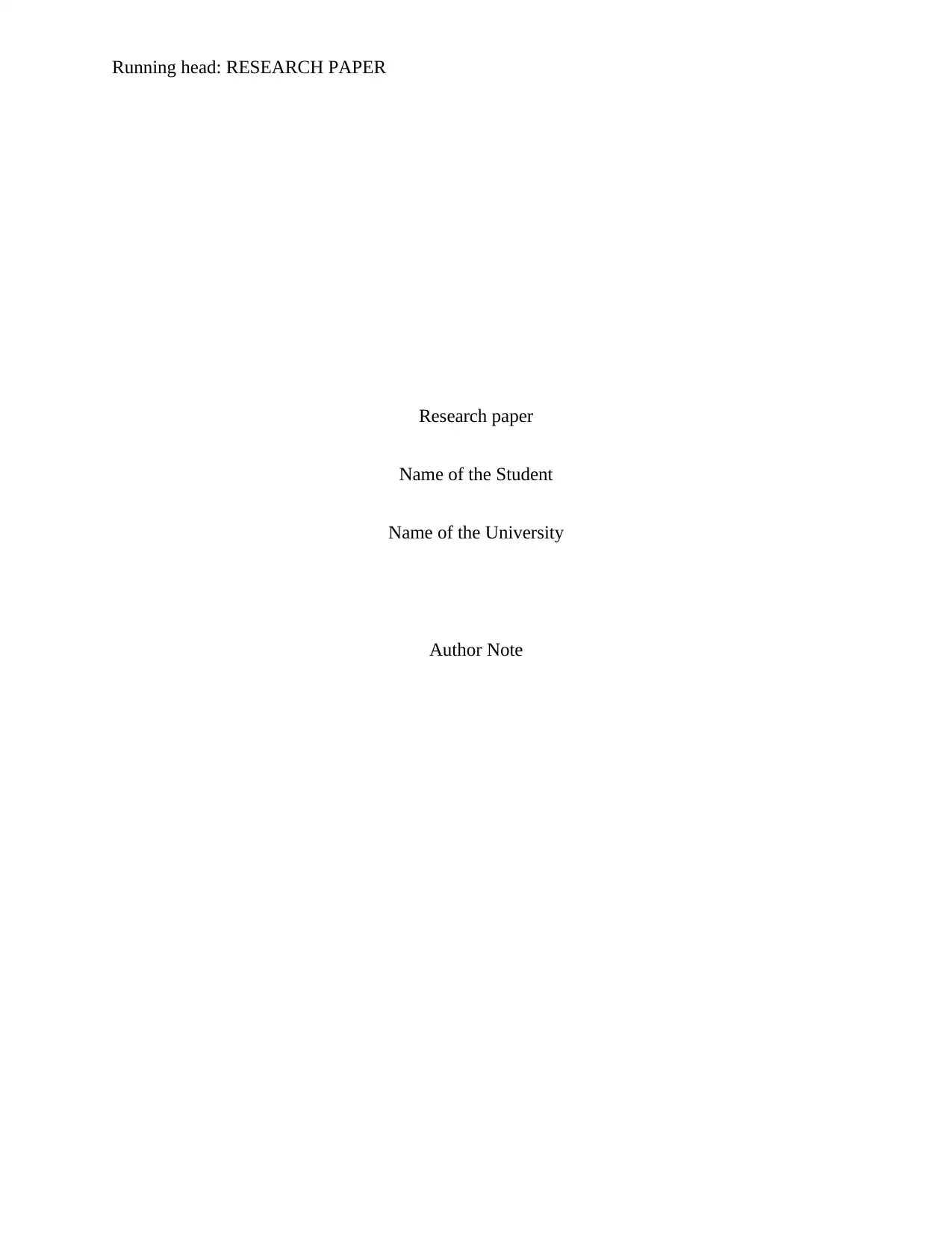
Running head: RESEARCH PAPER
Research paper
Name of the Student
Name of the University
Author Note
Research paper
Name of the Student
Name of the University
Author Note
Paraphrase This Document
Need a fresh take? Get an instant paraphrase of this document with our AI Paraphraser
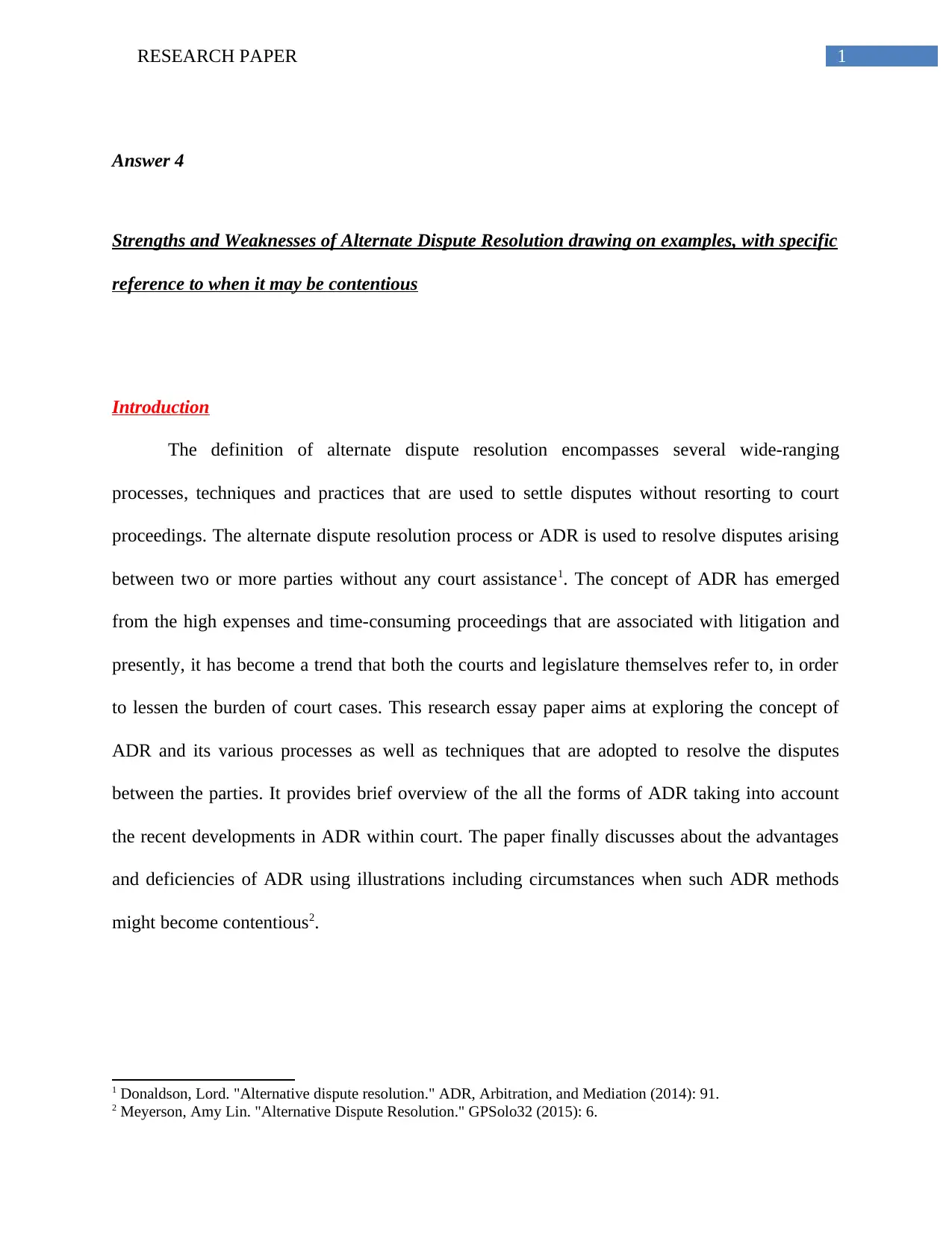
1RESEARCH PAPER
Answer 4
Strengths and Weaknesses of Alternate Dispute Resolution drawing on examples, with specific
reference to when it may be contentious
Introduction
The definition of alternate dispute resolution encompasses several wide-ranging
processes, techniques and practices that are used to settle disputes without resorting to court
proceedings. The alternate dispute resolution process or ADR is used to resolve disputes arising
between two or more parties without any court assistance1. The concept of ADR has emerged
from the high expenses and time-consuming proceedings that are associated with litigation and
presently, it has become a trend that both the courts and legislature themselves refer to, in order
to lessen the burden of court cases. This research essay paper aims at exploring the concept of
ADR and its various processes as well as techniques that are adopted to resolve the disputes
between the parties. It provides brief overview of the all the forms of ADR taking into account
the recent developments in ADR within court. The paper finally discusses about the advantages
and deficiencies of ADR using illustrations including circumstances when such ADR methods
might become contentious2.
1 Donaldson, Lord. "Alternative dispute resolution." ADR, Arbitration, and Mediation (2014): 91.
2 Meyerson, Amy Lin. "Alternative Dispute Resolution." GPSolo32 (2015): 6.
Answer 4
Strengths and Weaknesses of Alternate Dispute Resolution drawing on examples, with specific
reference to when it may be contentious
Introduction
The definition of alternate dispute resolution encompasses several wide-ranging
processes, techniques and practices that are used to settle disputes without resorting to court
proceedings. The alternate dispute resolution process or ADR is used to resolve disputes arising
between two or more parties without any court assistance1. The concept of ADR has emerged
from the high expenses and time-consuming proceedings that are associated with litigation and
presently, it has become a trend that both the courts and legislature themselves refer to, in order
to lessen the burden of court cases. This research essay paper aims at exploring the concept of
ADR and its various processes as well as techniques that are adopted to resolve the disputes
between the parties. It provides brief overview of the all the forms of ADR taking into account
the recent developments in ADR within court. The paper finally discusses about the advantages
and deficiencies of ADR using illustrations including circumstances when such ADR methods
might become contentious2.
1 Donaldson, Lord. "Alternative dispute resolution." ADR, Arbitration, and Mediation (2014): 91.
2 Meyerson, Amy Lin. "Alternative Dispute Resolution." GPSolo32 (2015): 6.
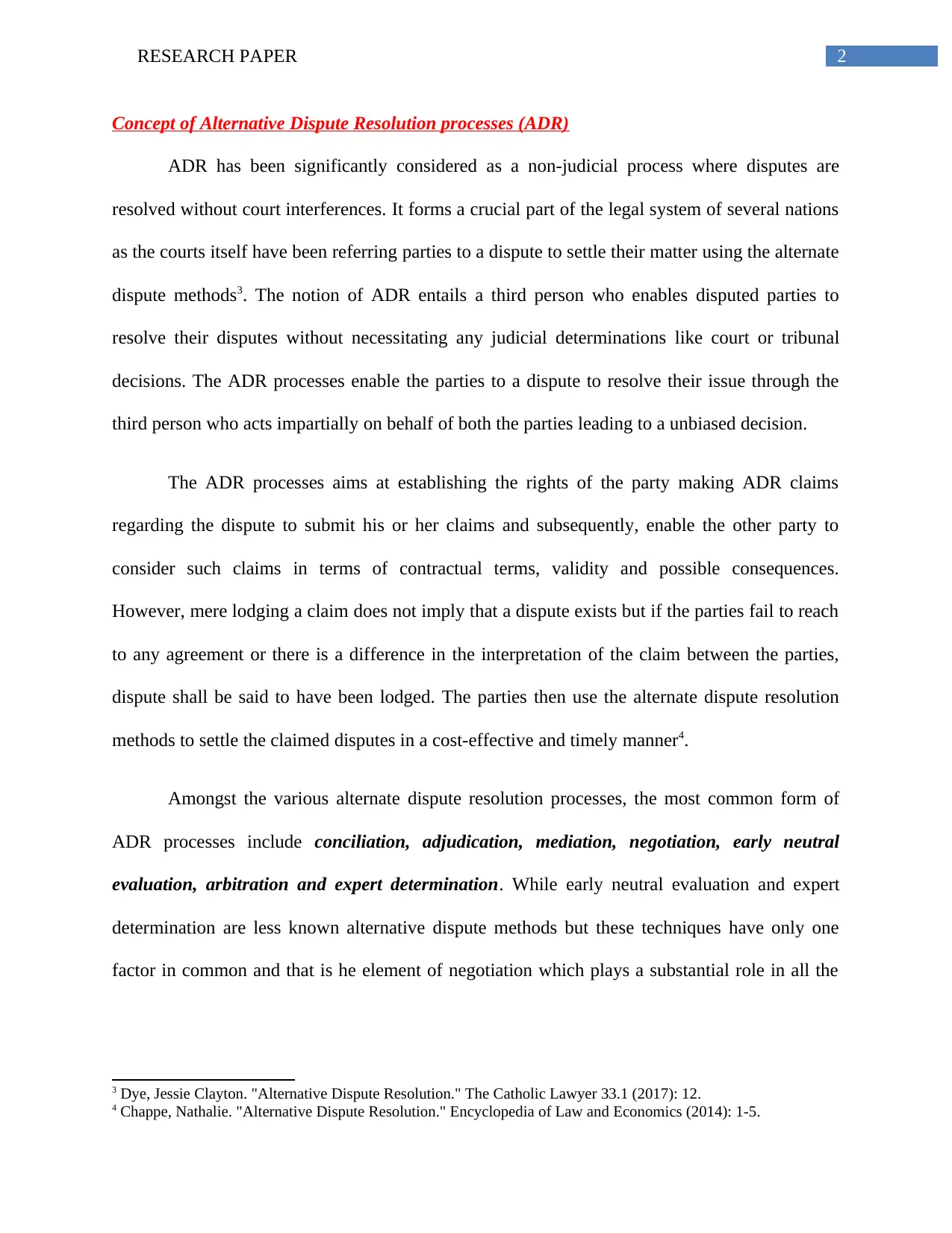
2RESEARCH PAPER
Concept of Alternative Dispute Resolution processes (ADR)
ADR has been significantly considered as a non-judicial process where disputes are
resolved without court interferences. It forms a crucial part of the legal system of several nations
as the courts itself have been referring parties to a dispute to settle their matter using the alternate
dispute methods3. The notion of ADR entails a third person who enables disputed parties to
resolve their disputes without necessitating any judicial determinations like court or tribunal
decisions. The ADR processes enable the parties to a dispute to resolve their issue through the
third person who acts impartially on behalf of both the parties leading to a unbiased decision.
The ADR processes aims at establishing the rights of the party making ADR claims
regarding the dispute to submit his or her claims and subsequently, enable the other party to
consider such claims in terms of contractual terms, validity and possible consequences.
However, mere lodging a claim does not imply that a dispute exists but if the parties fail to reach
to any agreement or there is a difference in the interpretation of the claim between the parties,
dispute shall be said to have been lodged. The parties then use the alternate dispute resolution
methods to settle the claimed disputes in a cost-effective and timely manner4.
Amongst the various alternate dispute resolution processes, the most common form of
ADR processes include conciliation, adjudication, mediation, negotiation, early neutral
evaluation, arbitration and expert determination. While early neutral evaluation and expert
determination are less known alternative dispute methods but these techniques have only one
factor in common and that is he element of negotiation which plays a substantial role in all the
3 Dye, Jessie Clayton. "Alternative Dispute Resolution." The Catholic Lawyer 33.1 (2017): 12.
4 Chappe, Nathalie. "Alternative Dispute Resolution." Encyclopedia of Law and Economics (2014): 1-5.
Concept of Alternative Dispute Resolution processes (ADR)
ADR has been significantly considered as a non-judicial process where disputes are
resolved without court interferences. It forms a crucial part of the legal system of several nations
as the courts itself have been referring parties to a dispute to settle their matter using the alternate
dispute methods3. The notion of ADR entails a third person who enables disputed parties to
resolve their disputes without necessitating any judicial determinations like court or tribunal
decisions. The ADR processes enable the parties to a dispute to resolve their issue through the
third person who acts impartially on behalf of both the parties leading to a unbiased decision.
The ADR processes aims at establishing the rights of the party making ADR claims
regarding the dispute to submit his or her claims and subsequently, enable the other party to
consider such claims in terms of contractual terms, validity and possible consequences.
However, mere lodging a claim does not imply that a dispute exists but if the parties fail to reach
to any agreement or there is a difference in the interpretation of the claim between the parties,
dispute shall be said to have been lodged. The parties then use the alternate dispute resolution
methods to settle the claimed disputes in a cost-effective and timely manner4.
Amongst the various alternate dispute resolution processes, the most common form of
ADR processes include conciliation, adjudication, mediation, negotiation, early neutral
evaluation, arbitration and expert determination. While early neutral evaluation and expert
determination are less known alternative dispute methods but these techniques have only one
factor in common and that is he element of negotiation which plays a substantial role in all the
3 Dye, Jessie Clayton. "Alternative Dispute Resolution." The Catholic Lawyer 33.1 (2017): 12.
4 Chappe, Nathalie. "Alternative Dispute Resolution." Encyclopedia of Law and Economics (2014): 1-5.
⊘ This is a preview!⊘
Do you want full access?
Subscribe today to unlock all pages.

Trusted by 1+ million students worldwide
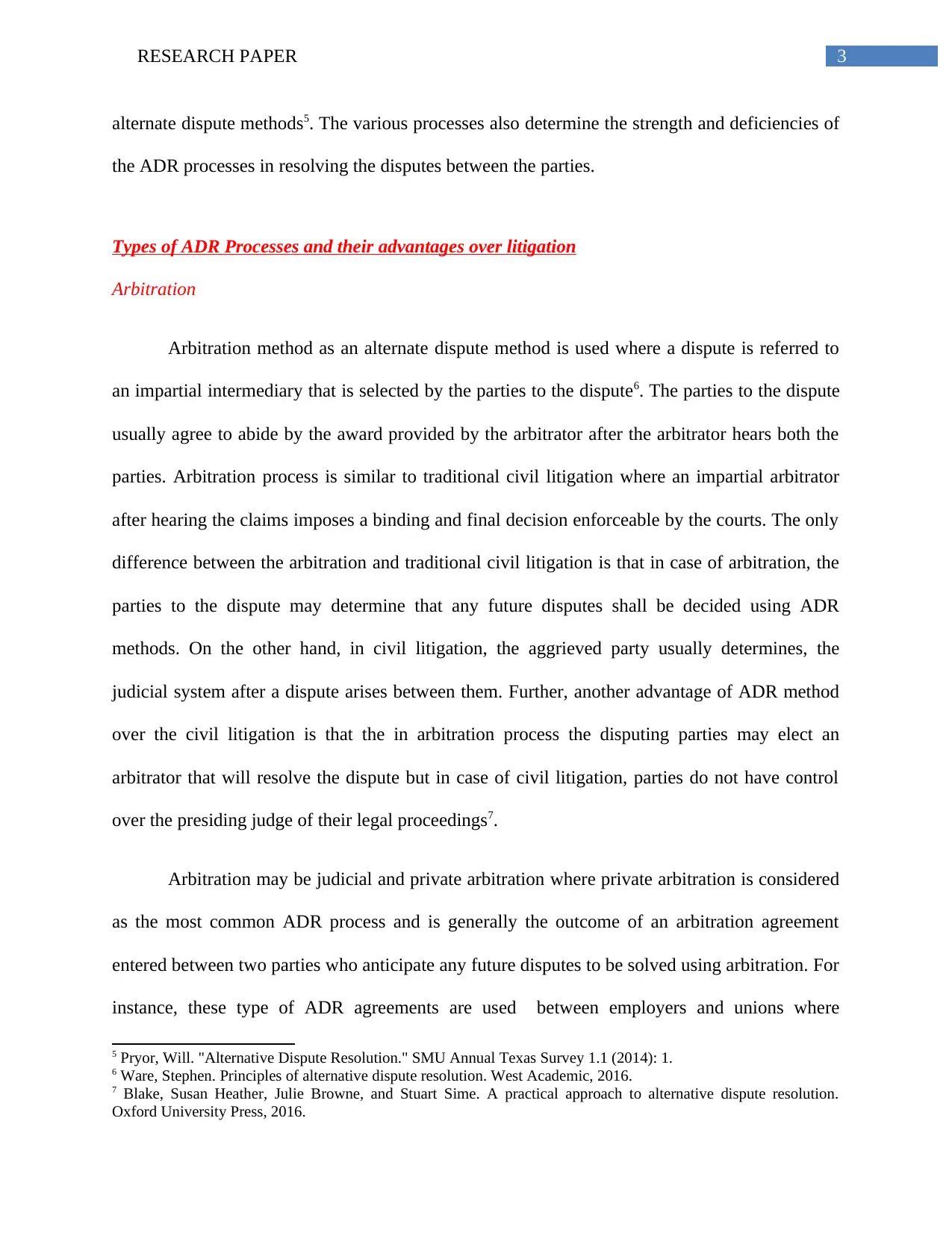
3RESEARCH PAPER
alternate dispute methods5. The various processes also determine the strength and deficiencies of
the ADR processes in resolving the disputes between the parties.
Types of ADR Processes and their advantages over litigation
Arbitration
Arbitration method as an alternate dispute method is used where a dispute is referred to
an impartial intermediary that is selected by the parties to the dispute6. The parties to the dispute
usually agree to abide by the award provided by the arbitrator after the arbitrator hears both the
parties. Arbitration process is similar to traditional civil litigation where an impartial arbitrator
after hearing the claims imposes a binding and final decision enforceable by the courts. The only
difference between the arbitration and traditional civil litigation is that in case of arbitration, the
parties to the dispute may determine that any future disputes shall be decided using ADR
methods. On the other hand, in civil litigation, the aggrieved party usually determines, the
judicial system after a dispute arises between them. Further, another advantage of ADR method
over the civil litigation is that the in arbitration process the disputing parties may elect an
arbitrator that will resolve the dispute but in case of civil litigation, parties do not have control
over the presiding judge of their legal proceedings7.
Arbitration may be judicial and private arbitration where private arbitration is considered
as the most common ADR process and is generally the outcome of an arbitration agreement
entered between two parties who anticipate any future disputes to be solved using arbitration. For
instance, these type of ADR agreements are used between employers and unions where
5 Pryor, Will. "Alternative Dispute Resolution." SMU Annual Texas Survey 1.1 (2014): 1.
6 Ware, Stephen. Principles of alternative dispute resolution. West Academic, 2016.
7 Blake, Susan Heather, Julie Browne, and Stuart Sime. A practical approach to alternative dispute resolution.
Oxford University Press, 2016.
alternate dispute methods5. The various processes also determine the strength and deficiencies of
the ADR processes in resolving the disputes between the parties.
Types of ADR Processes and their advantages over litigation
Arbitration
Arbitration method as an alternate dispute method is used where a dispute is referred to
an impartial intermediary that is selected by the parties to the dispute6. The parties to the dispute
usually agree to abide by the award provided by the arbitrator after the arbitrator hears both the
parties. Arbitration process is similar to traditional civil litigation where an impartial arbitrator
after hearing the claims imposes a binding and final decision enforceable by the courts. The only
difference between the arbitration and traditional civil litigation is that in case of arbitration, the
parties to the dispute may determine that any future disputes shall be decided using ADR
methods. On the other hand, in civil litigation, the aggrieved party usually determines, the
judicial system after a dispute arises between them. Further, another advantage of ADR method
over the civil litigation is that the in arbitration process the disputing parties may elect an
arbitrator that will resolve the dispute but in case of civil litigation, parties do not have control
over the presiding judge of their legal proceedings7.
Arbitration may be judicial and private arbitration where private arbitration is considered
as the most common ADR process and is generally the outcome of an arbitration agreement
entered between two parties who anticipate any future disputes to be solved using arbitration. For
instance, these type of ADR agreements are used between employers and unions where
5 Pryor, Will. "Alternative Dispute Resolution." SMU Annual Texas Survey 1.1 (2014): 1.
6 Ware, Stephen. Principles of alternative dispute resolution. West Academic, 2016.
7 Blake, Susan Heather, Julie Browne, and Stuart Sime. A practical approach to alternative dispute resolution.
Oxford University Press, 2016.
Paraphrase This Document
Need a fresh take? Get an instant paraphrase of this document with our AI Paraphraser
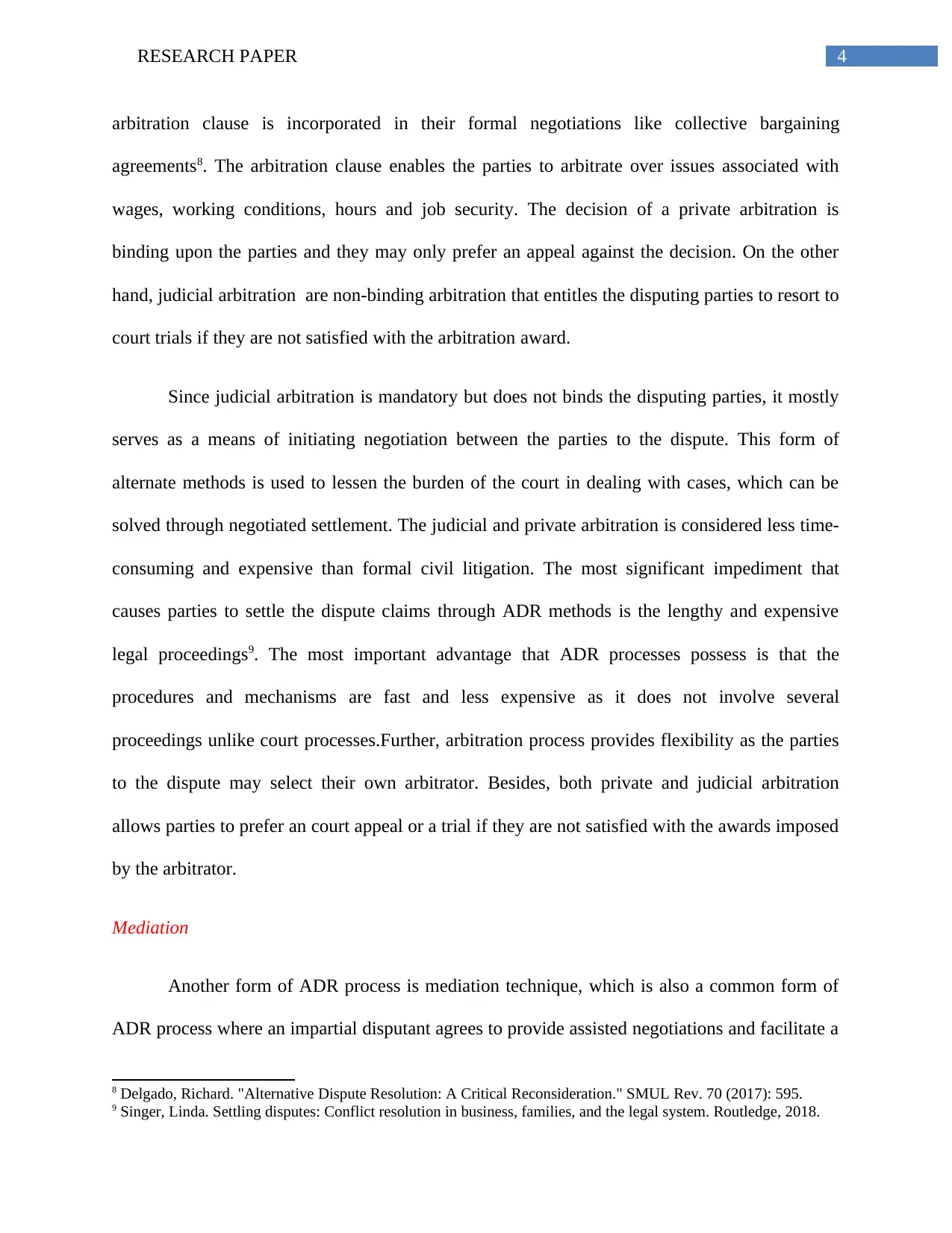
4RESEARCH PAPER
arbitration clause is incorporated in their formal negotiations like collective bargaining
agreements8. The arbitration clause enables the parties to arbitrate over issues associated with
wages, working conditions, hours and job security. The decision of a private arbitration is
binding upon the parties and they may only prefer an appeal against the decision. On the other
hand, judicial arbitration are non-binding arbitration that entitles the disputing parties to resort to
court trials if they are not satisfied with the arbitration award.
Since judicial arbitration is mandatory but does not binds the disputing parties, it mostly
serves as a means of initiating negotiation between the parties to the dispute. This form of
alternate methods is used to lessen the burden of the court in dealing with cases, which can be
solved through negotiated settlement. The judicial and private arbitration is considered less time-
consuming and expensive than formal civil litigation. The most significant impediment that
causes parties to settle the dispute claims through ADR methods is the lengthy and expensive
legal proceedings9. The most important advantage that ADR processes possess is that the
procedures and mechanisms are fast and less expensive as it does not involve several
proceedings unlike court processes.Further, arbitration process provides flexibility as the parties
to the dispute may select their own arbitrator. Besides, both private and judicial arbitration
allows parties to prefer an court appeal or a trial if they are not satisfied with the awards imposed
by the arbitrator.
Mediation
Another form of ADR process is mediation technique, which is also a common form of
ADR process where an impartial disputant agrees to provide assisted negotiations and facilitate a
8 Delgado, Richard. "Alternative Dispute Resolution: A Critical Reconsideration." SMUL Rev. 70 (2017): 595.
9 Singer, Linda. Settling disputes: Conflict resolution in business, families, and the legal system. Routledge, 2018.
arbitration clause is incorporated in their formal negotiations like collective bargaining
agreements8. The arbitration clause enables the parties to arbitrate over issues associated with
wages, working conditions, hours and job security. The decision of a private arbitration is
binding upon the parties and they may only prefer an appeal against the decision. On the other
hand, judicial arbitration are non-binding arbitration that entitles the disputing parties to resort to
court trials if they are not satisfied with the arbitration award.
Since judicial arbitration is mandatory but does not binds the disputing parties, it mostly
serves as a means of initiating negotiation between the parties to the dispute. This form of
alternate methods is used to lessen the burden of the court in dealing with cases, which can be
solved through negotiated settlement. The judicial and private arbitration is considered less time-
consuming and expensive than formal civil litigation. The most significant impediment that
causes parties to settle the dispute claims through ADR methods is the lengthy and expensive
legal proceedings9. The most important advantage that ADR processes possess is that the
procedures and mechanisms are fast and less expensive as it does not involve several
proceedings unlike court processes.Further, arbitration process provides flexibility as the parties
to the dispute may select their own arbitrator. Besides, both private and judicial arbitration
allows parties to prefer an court appeal or a trial if they are not satisfied with the awards imposed
by the arbitrator.
Mediation
Another form of ADR process is mediation technique, which is also a common form of
ADR process where an impartial disputant agrees to provide assisted negotiations and facilitate a
8 Delgado, Richard. "Alternative Dispute Resolution: A Critical Reconsideration." SMUL Rev. 70 (2017): 595.
9 Singer, Linda. Settling disputes: Conflict resolution in business, families, and the legal system. Routledge, 2018.
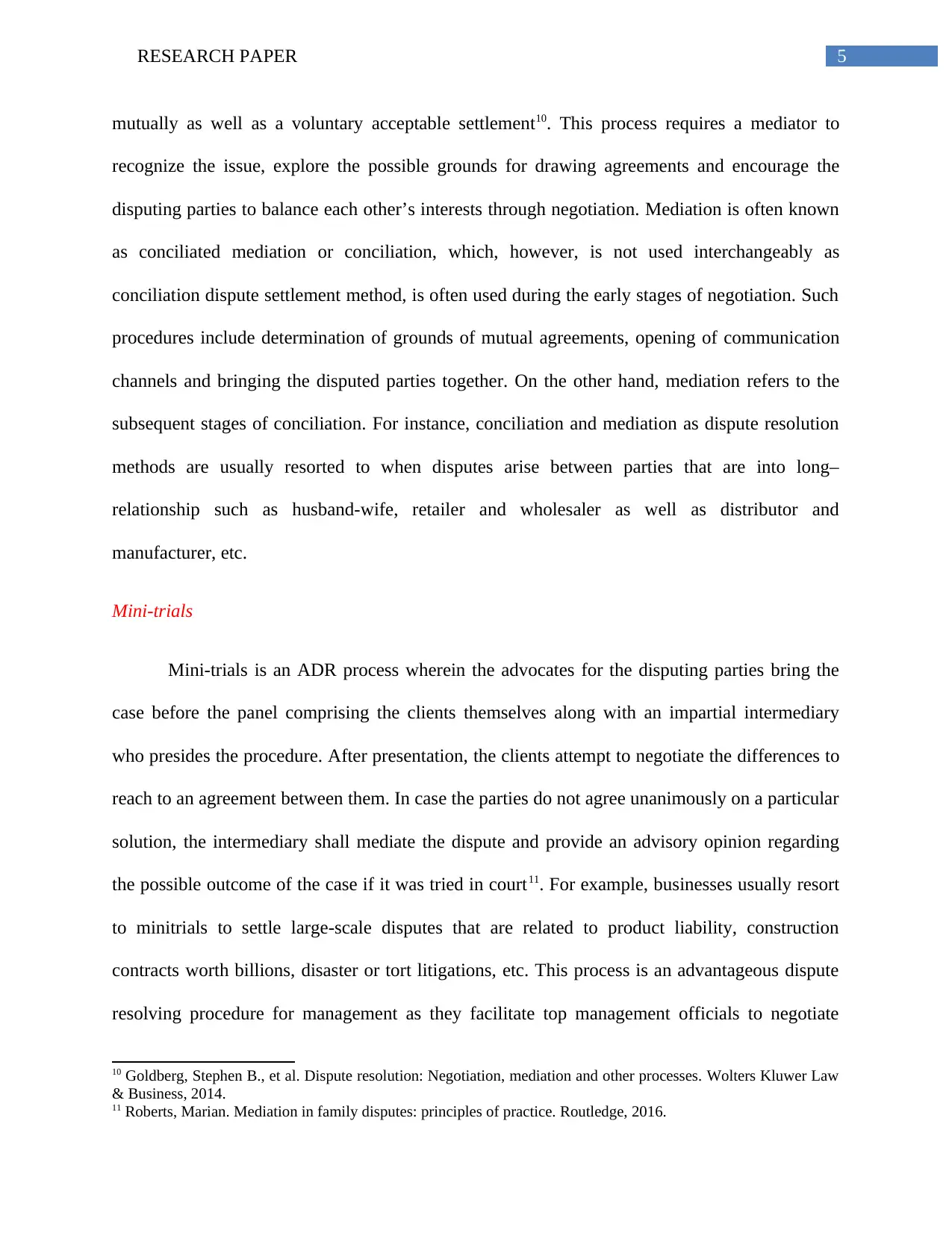
5RESEARCH PAPER
mutually as well as a voluntary acceptable settlement10. This process requires a mediator to
recognize the issue, explore the possible grounds for drawing agreements and encourage the
disputing parties to balance each other’s interests through negotiation. Mediation is often known
as conciliated mediation or conciliation, which, however, is not used interchangeably as
conciliation dispute settlement method, is often used during the early stages of negotiation. Such
procedures include determination of grounds of mutual agreements, opening of communication
channels and bringing the disputed parties together. On the other hand, mediation refers to the
subsequent stages of conciliation. For instance, conciliation and mediation as dispute resolution
methods are usually resorted to when disputes arise between parties that are into long–
relationship such as husband-wife, retailer and wholesaler as well as distributor and
manufacturer, etc.
Mini-trials
Mini-trials is an ADR process wherein the advocates for the disputing parties bring the
case before the panel comprising the clients themselves along with an impartial intermediary
who presides the procedure. After presentation, the clients attempt to negotiate the differences to
reach to an agreement between them. In case the parties do not agree unanimously on a particular
solution, the intermediary shall mediate the dispute and provide an advisory opinion regarding
the possible outcome of the case if it was tried in court11. For example, businesses usually resort
to minitrials to settle large-scale disputes that are related to product liability, construction
contracts worth billions, disaster or tort litigations, etc. This process is an advantageous dispute
resolving procedure for management as they facilitate top management officials to negotiate
10 Goldberg, Stephen B., et al. Dispute resolution: Negotiation, mediation and other processes. Wolters Kluwer Law
& Business, 2014.
11 Roberts, Marian. Mediation in family disputes: principles of practice. Routledge, 2016.
mutually as well as a voluntary acceptable settlement10. This process requires a mediator to
recognize the issue, explore the possible grounds for drawing agreements and encourage the
disputing parties to balance each other’s interests through negotiation. Mediation is often known
as conciliated mediation or conciliation, which, however, is not used interchangeably as
conciliation dispute settlement method, is often used during the early stages of negotiation. Such
procedures include determination of grounds of mutual agreements, opening of communication
channels and bringing the disputed parties together. On the other hand, mediation refers to the
subsequent stages of conciliation. For instance, conciliation and mediation as dispute resolution
methods are usually resorted to when disputes arise between parties that are into long–
relationship such as husband-wife, retailer and wholesaler as well as distributor and
manufacturer, etc.
Mini-trials
Mini-trials is an ADR process wherein the advocates for the disputing parties bring the
case before the panel comprising the clients themselves along with an impartial intermediary
who presides the procedure. After presentation, the clients attempt to negotiate the differences to
reach to an agreement between them. In case the parties do not agree unanimously on a particular
solution, the intermediary shall mediate the dispute and provide an advisory opinion regarding
the possible outcome of the case if it was tried in court11. For example, businesses usually resort
to minitrials to settle large-scale disputes that are related to product liability, construction
contracts worth billions, disaster or tort litigations, etc. This process is an advantageous dispute
resolving procedure for management as they facilitate top management officials to negotiate
10 Goldberg, Stephen B., et al. Dispute resolution: Negotiation, mediation and other processes. Wolters Kluwer Law
& Business, 2014.
11 Roberts, Marian. Mediation in family disputes: principles of practice. Routledge, 2016.
⊘ This is a preview!⊘
Do you want full access?
Subscribe today to unlock all pages.

Trusted by 1+ million students worldwide
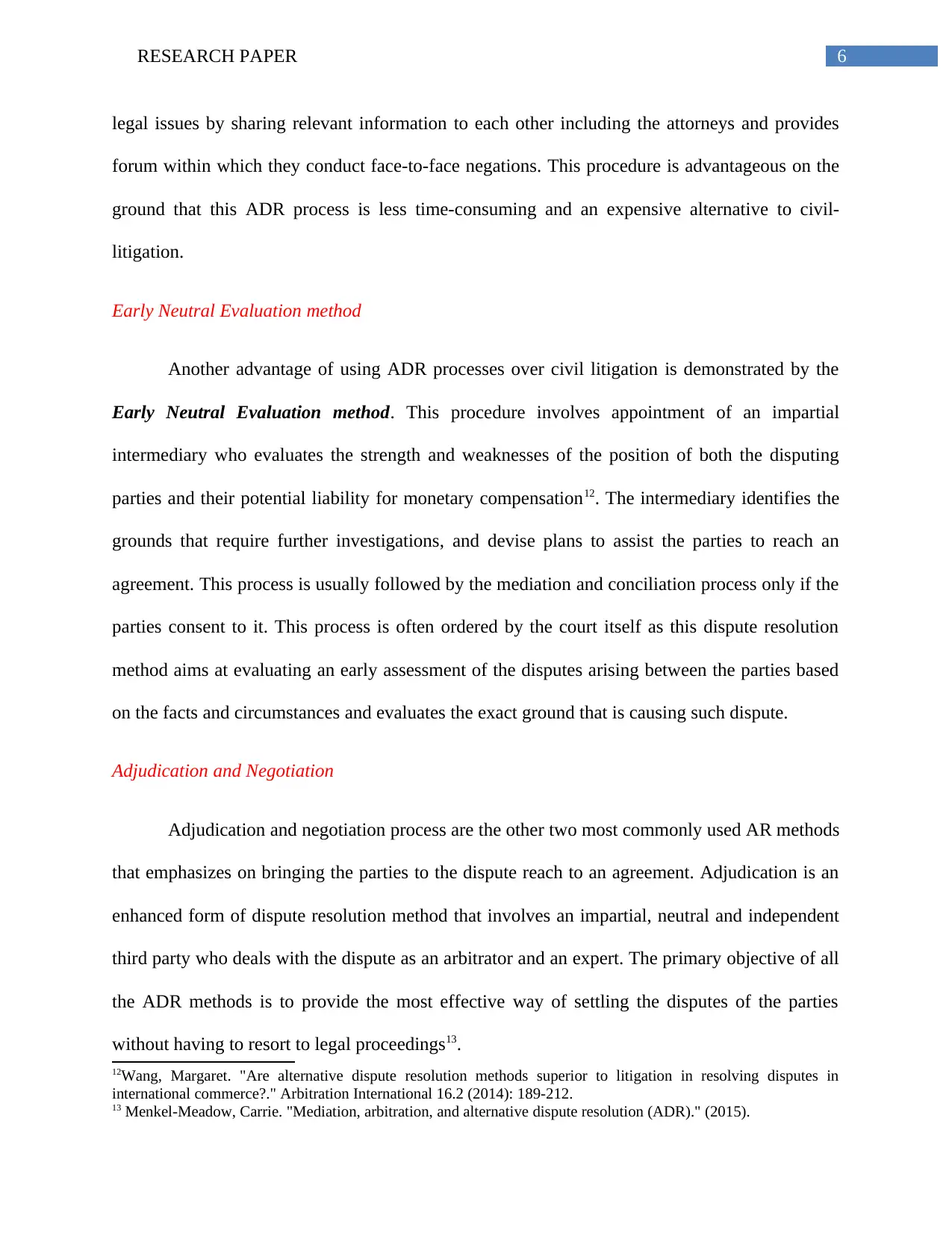
6RESEARCH PAPER
legal issues by sharing relevant information to each other including the attorneys and provides
forum within which they conduct face-to-face negations. This procedure is advantageous on the
ground that this ADR process is less time-consuming and an expensive alternative to civil-
litigation.
Early Neutral Evaluation method
Another advantage of using ADR processes over civil litigation is demonstrated by the
Early Neutral Evaluation method. This procedure involves appointment of an impartial
intermediary who evaluates the strength and weaknesses of the position of both the disputing
parties and their potential liability for monetary compensation12. The intermediary identifies the
grounds that require further investigations, and devise plans to assist the parties to reach an
agreement. This process is usually followed by the mediation and conciliation process only if the
parties consent to it. This process is often ordered by the court itself as this dispute resolution
method aims at evaluating an early assessment of the disputes arising between the parties based
on the facts and circumstances and evaluates the exact ground that is causing such dispute.
Adjudication and Negotiation
Adjudication and negotiation process are the other two most commonly used AR methods
that emphasizes on bringing the parties to the dispute reach to an agreement. Adjudication is an
enhanced form of dispute resolution method that involves an impartial, neutral and independent
third party who deals with the dispute as an arbitrator and an expert. The primary objective of all
the ADR methods is to provide the most effective way of settling the disputes of the parties
without having to resort to legal proceedings13.
12Wang, Margaret. "Are alternative dispute resolution methods superior to litigation in resolving disputes in
international commerce?." Arbitration International 16.2 (2014): 189-212.
13 Menkel-Meadow, Carrie. "Mediation, arbitration, and alternative dispute resolution (ADR)." (2015).
legal issues by sharing relevant information to each other including the attorneys and provides
forum within which they conduct face-to-face negations. This procedure is advantageous on the
ground that this ADR process is less time-consuming and an expensive alternative to civil-
litigation.
Early Neutral Evaluation method
Another advantage of using ADR processes over civil litigation is demonstrated by the
Early Neutral Evaluation method. This procedure involves appointment of an impartial
intermediary who evaluates the strength and weaknesses of the position of both the disputing
parties and their potential liability for monetary compensation12. The intermediary identifies the
grounds that require further investigations, and devise plans to assist the parties to reach an
agreement. This process is usually followed by the mediation and conciliation process only if the
parties consent to it. This process is often ordered by the court itself as this dispute resolution
method aims at evaluating an early assessment of the disputes arising between the parties based
on the facts and circumstances and evaluates the exact ground that is causing such dispute.
Adjudication and Negotiation
Adjudication and negotiation process are the other two most commonly used AR methods
that emphasizes on bringing the parties to the dispute reach to an agreement. Adjudication is an
enhanced form of dispute resolution method that involves an impartial, neutral and independent
third party who deals with the dispute as an arbitrator and an expert. The primary objective of all
the ADR methods is to provide the most effective way of settling the disputes of the parties
without having to resort to legal proceedings13.
12Wang, Margaret. "Are alternative dispute resolution methods superior to litigation in resolving disputes in
international commerce?." Arbitration International 16.2 (2014): 189-212.
13 Menkel-Meadow, Carrie. "Mediation, arbitration, and alternative dispute resolution (ADR)." (2015).
Paraphrase This Document
Need a fresh take? Get an instant paraphrase of this document with our AI Paraphraser
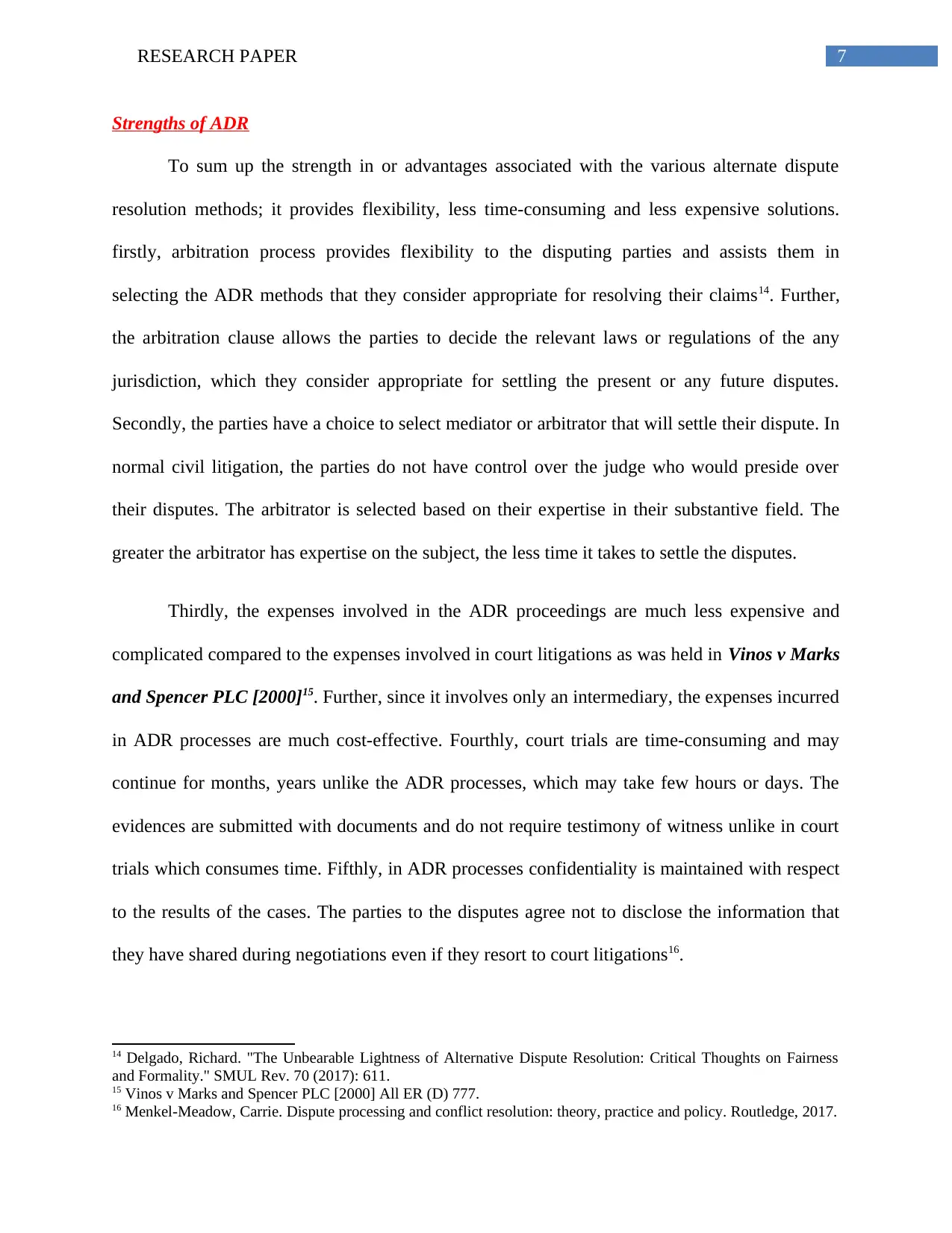
7RESEARCH PAPER
Strengths of ADR
To sum up the strength in or advantages associated with the various alternate dispute
resolution methods; it provides flexibility, less time-consuming and less expensive solutions.
firstly, arbitration process provides flexibility to the disputing parties and assists them in
selecting the ADR methods that they consider appropriate for resolving their claims14. Further,
the arbitration clause allows the parties to decide the relevant laws or regulations of the any
jurisdiction, which they consider appropriate for settling the present or any future disputes.
Secondly, the parties have a choice to select mediator or arbitrator that will settle their dispute. In
normal civil litigation, the parties do not have control over the judge who would preside over
their disputes. The arbitrator is selected based on their expertise in their substantive field. The
greater the arbitrator has expertise on the subject, the less time it takes to settle the disputes.
Thirdly, the expenses involved in the ADR proceedings are much less expensive and
complicated compared to the expenses involved in court litigations as was held in Vinos v Marks
and Spencer PLC [2000]15. Further, since it involves only an intermediary, the expenses incurred
in ADR processes are much cost-effective. Fourthly, court trials are time-consuming and may
continue for months, years unlike the ADR processes, which may take few hours or days. The
evidences are submitted with documents and do not require testimony of witness unlike in court
trials which consumes time. Fifthly, in ADR processes confidentiality is maintained with respect
to the results of the cases. The parties to the disputes agree not to disclose the information that
they have shared during negotiations even if they resort to court litigations16.
14 Delgado, Richard. "The Unbearable Lightness of Alternative Dispute Resolution: Critical Thoughts on Fairness
and Formality." SMUL Rev. 70 (2017): 611.
15 Vinos v Marks and Spencer PLC [2000] All ER (D) 777.
16 Menkel-Meadow, Carrie. Dispute processing and conflict resolution: theory, practice and policy. Routledge, 2017.
Strengths of ADR
To sum up the strength in or advantages associated with the various alternate dispute
resolution methods; it provides flexibility, less time-consuming and less expensive solutions.
firstly, arbitration process provides flexibility to the disputing parties and assists them in
selecting the ADR methods that they consider appropriate for resolving their claims14. Further,
the arbitration clause allows the parties to decide the relevant laws or regulations of the any
jurisdiction, which they consider appropriate for settling the present or any future disputes.
Secondly, the parties have a choice to select mediator or arbitrator that will settle their dispute. In
normal civil litigation, the parties do not have control over the judge who would preside over
their disputes. The arbitrator is selected based on their expertise in their substantive field. The
greater the arbitrator has expertise on the subject, the less time it takes to settle the disputes.
Thirdly, the expenses involved in the ADR proceedings are much less expensive and
complicated compared to the expenses involved in court litigations as was held in Vinos v Marks
and Spencer PLC [2000]15. Further, since it involves only an intermediary, the expenses incurred
in ADR processes are much cost-effective. Fourthly, court trials are time-consuming and may
continue for months, years unlike the ADR processes, which may take few hours or days. The
evidences are submitted with documents and do not require testimony of witness unlike in court
trials which consumes time. Fifthly, in ADR processes confidentiality is maintained with respect
to the results of the cases. The parties to the disputes agree not to disclose the information that
they have shared during negotiations even if they resort to court litigations16.
14 Delgado, Richard. "The Unbearable Lightness of Alternative Dispute Resolution: Critical Thoughts on Fairness
and Formality." SMUL Rev. 70 (2017): 611.
15 Vinos v Marks and Spencer PLC [2000] All ER (D) 777.
16 Menkel-Meadow, Carrie. Dispute processing and conflict resolution: theory, practice and policy. Routledge, 2017.
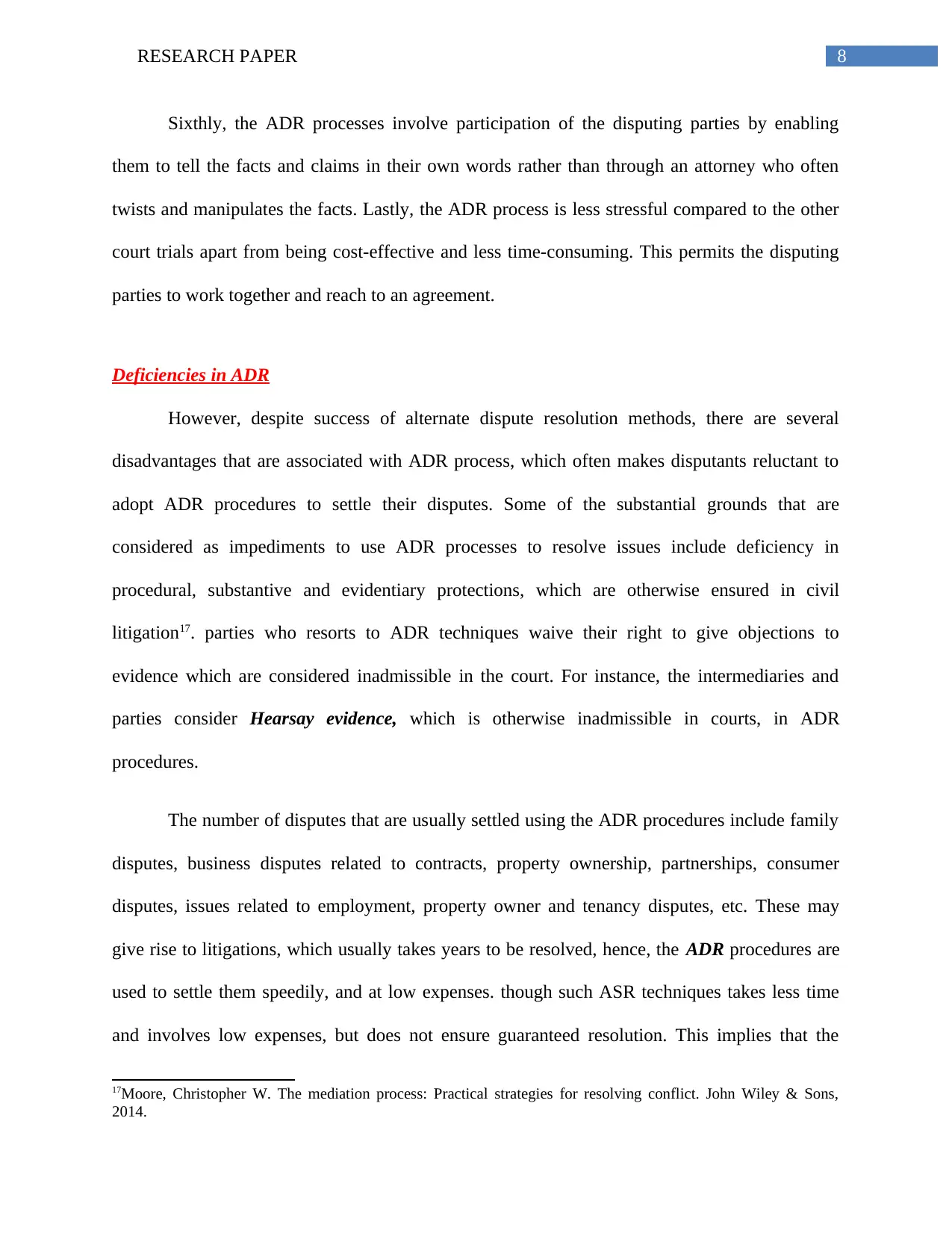
8RESEARCH PAPER
Sixthly, the ADR processes involve participation of the disputing parties by enabling
them to tell the facts and claims in their own words rather than through an attorney who often
twists and manipulates the facts. Lastly, the ADR process is less stressful compared to the other
court trials apart from being cost-effective and less time-consuming. This permits the disputing
parties to work together and reach to an agreement.
Deficiencies in ADR
However, despite success of alternate dispute resolution methods, there are several
disadvantages that are associated with ADR process, which often makes disputants reluctant to
adopt ADR procedures to settle their disputes. Some of the substantial grounds that are
considered as impediments to use ADR processes to resolve issues include deficiency in
procedural, substantive and evidentiary protections, which are otherwise ensured in civil
litigation17. parties who resorts to ADR techniques waive their right to give objections to
evidence which are considered inadmissible in the court. For instance, the intermediaries and
parties consider Hearsay evidence, which is otherwise inadmissible in courts, in ADR
procedures.
The number of disputes that are usually settled using the ADR procedures include family
disputes, business disputes related to contracts, property ownership, partnerships, consumer
disputes, issues related to employment, property owner and tenancy disputes, etc. These may
give rise to litigations, which usually takes years to be resolved, hence, the ADR procedures are
used to settle them speedily, and at low expenses. though such ASR techniques takes less time
and involves low expenses, but does not ensure guaranteed resolution. This implies that the
17Moore, Christopher W. The mediation process: Practical strategies for resolving conflict. John Wiley & Sons,
2014.
Sixthly, the ADR processes involve participation of the disputing parties by enabling
them to tell the facts and claims in their own words rather than through an attorney who often
twists and manipulates the facts. Lastly, the ADR process is less stressful compared to the other
court trials apart from being cost-effective and less time-consuming. This permits the disputing
parties to work together and reach to an agreement.
Deficiencies in ADR
However, despite success of alternate dispute resolution methods, there are several
disadvantages that are associated with ADR process, which often makes disputants reluctant to
adopt ADR procedures to settle their disputes. Some of the substantial grounds that are
considered as impediments to use ADR processes to resolve issues include deficiency in
procedural, substantive and evidentiary protections, which are otherwise ensured in civil
litigation17. parties who resorts to ADR techniques waive their right to give objections to
evidence which are considered inadmissible in the court. For instance, the intermediaries and
parties consider Hearsay evidence, which is otherwise inadmissible in courts, in ADR
procedures.
The number of disputes that are usually settled using the ADR procedures include family
disputes, business disputes related to contracts, property ownership, partnerships, consumer
disputes, issues related to employment, property owner and tenancy disputes, etc. These may
give rise to litigations, which usually takes years to be resolved, hence, the ADR procedures are
used to settle them speedily, and at low expenses. though such ASR techniques takes less time
and involves low expenses, but does not ensure guaranteed resolution. This implies that the
17Moore, Christopher W. The mediation process: Practical strategies for resolving conflict. John Wiley & Sons,
2014.
⊘ This is a preview!⊘
Do you want full access?
Subscribe today to unlock all pages.

Trusted by 1+ million students worldwide
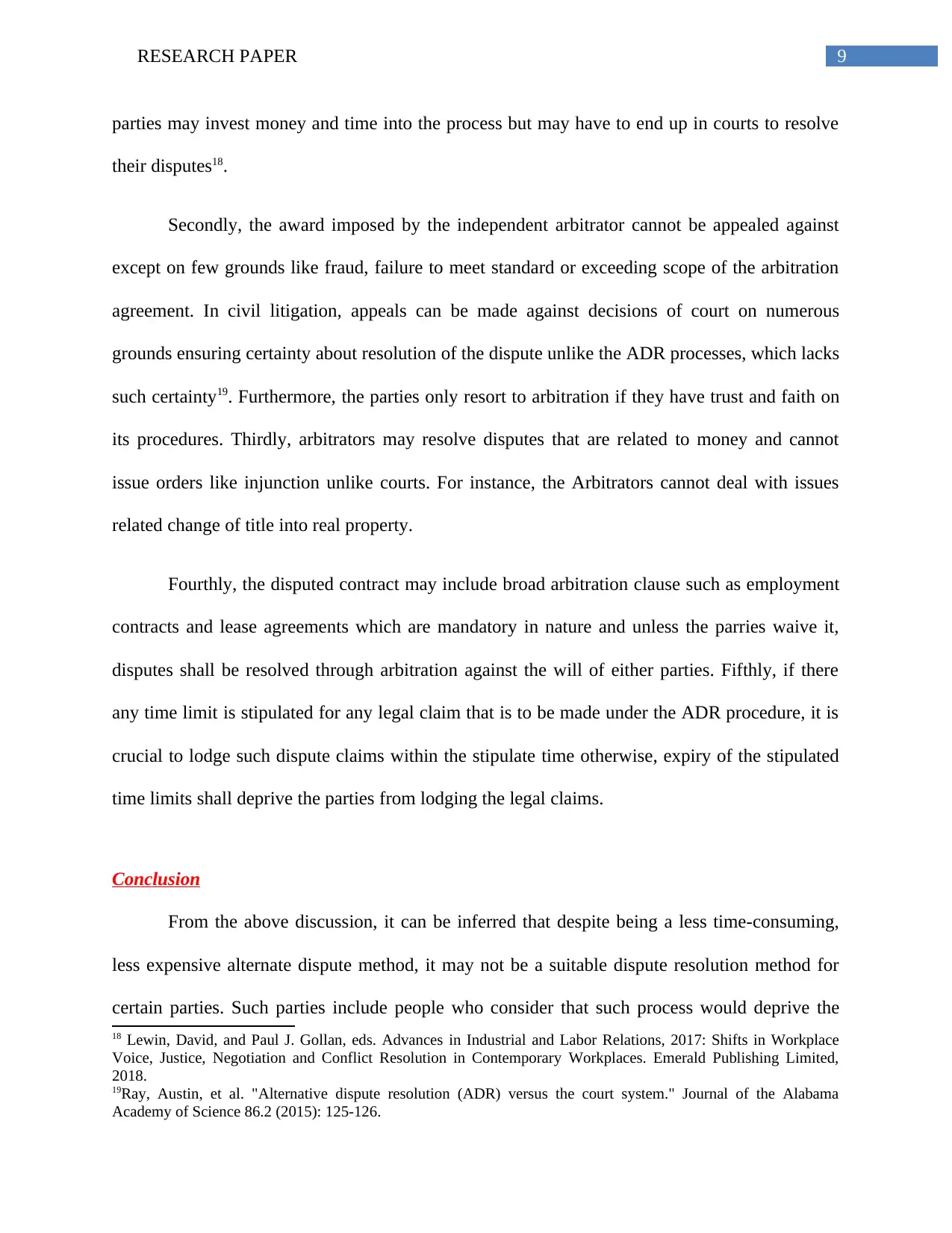
9RESEARCH PAPER
parties may invest money and time into the process but may have to end up in courts to resolve
their disputes18.
Secondly, the award imposed by the independent arbitrator cannot be appealed against
except on few grounds like fraud, failure to meet standard or exceeding scope of the arbitration
agreement. In civil litigation, appeals can be made against decisions of court on numerous
grounds ensuring certainty about resolution of the dispute unlike the ADR processes, which lacks
such certainty19. Furthermore, the parties only resort to arbitration if they have trust and faith on
its procedures. Thirdly, arbitrators may resolve disputes that are related to money and cannot
issue orders like injunction unlike courts. For instance, the Arbitrators cannot deal with issues
related change of title into real property.
Fourthly, the disputed contract may include broad arbitration clause such as employment
contracts and lease agreements which are mandatory in nature and unless the parries waive it,
disputes shall be resolved through arbitration against the will of either parties. Fifthly, if there
any time limit is stipulated for any legal claim that is to be made under the ADR procedure, it is
crucial to lodge such dispute claims within the stipulate time otherwise, expiry of the stipulated
time limits shall deprive the parties from lodging the legal claims.
Conclusion
From the above discussion, it can be inferred that despite being a less time-consuming,
less expensive alternate dispute method, it may not be a suitable dispute resolution method for
certain parties. Such parties include people who consider that such process would deprive the
18 Lewin, David, and Paul J. Gollan, eds. Advances in Industrial and Labor Relations, 2017: Shifts in Workplace
Voice, Justice, Negotiation and Conflict Resolution in Contemporary Workplaces. Emerald Publishing Limited,
2018.
19Ray, Austin, et al. "Alternative dispute resolution (ADR) versus the court system." Journal of the Alabama
Academy of Science 86.2 (2015): 125-126.
parties may invest money and time into the process but may have to end up in courts to resolve
their disputes18.
Secondly, the award imposed by the independent arbitrator cannot be appealed against
except on few grounds like fraud, failure to meet standard or exceeding scope of the arbitration
agreement. In civil litigation, appeals can be made against decisions of court on numerous
grounds ensuring certainty about resolution of the dispute unlike the ADR processes, which lacks
such certainty19. Furthermore, the parties only resort to arbitration if they have trust and faith on
its procedures. Thirdly, arbitrators may resolve disputes that are related to money and cannot
issue orders like injunction unlike courts. For instance, the Arbitrators cannot deal with issues
related change of title into real property.
Fourthly, the disputed contract may include broad arbitration clause such as employment
contracts and lease agreements which are mandatory in nature and unless the parries waive it,
disputes shall be resolved through arbitration against the will of either parties. Fifthly, if there
any time limit is stipulated for any legal claim that is to be made under the ADR procedure, it is
crucial to lodge such dispute claims within the stipulate time otherwise, expiry of the stipulated
time limits shall deprive the parties from lodging the legal claims.
Conclusion
From the above discussion, it can be inferred that despite being a less time-consuming,
less expensive alternate dispute method, it may not be a suitable dispute resolution method for
certain parties. Such parties include people who consider that such process would deprive the
18 Lewin, David, and Paul J. Gollan, eds. Advances in Industrial and Labor Relations, 2017: Shifts in Workplace
Voice, Justice, Negotiation and Conflict Resolution in Contemporary Workplaces. Emerald Publishing Limited,
2018.
19Ray, Austin, et al. "Alternative dispute resolution (ADR) versus the court system." Journal of the Alabama
Academy of Science 86.2 (2015): 125-126.
Paraphrase This Document
Need a fresh take? Get an instant paraphrase of this document with our AI Paraphraser
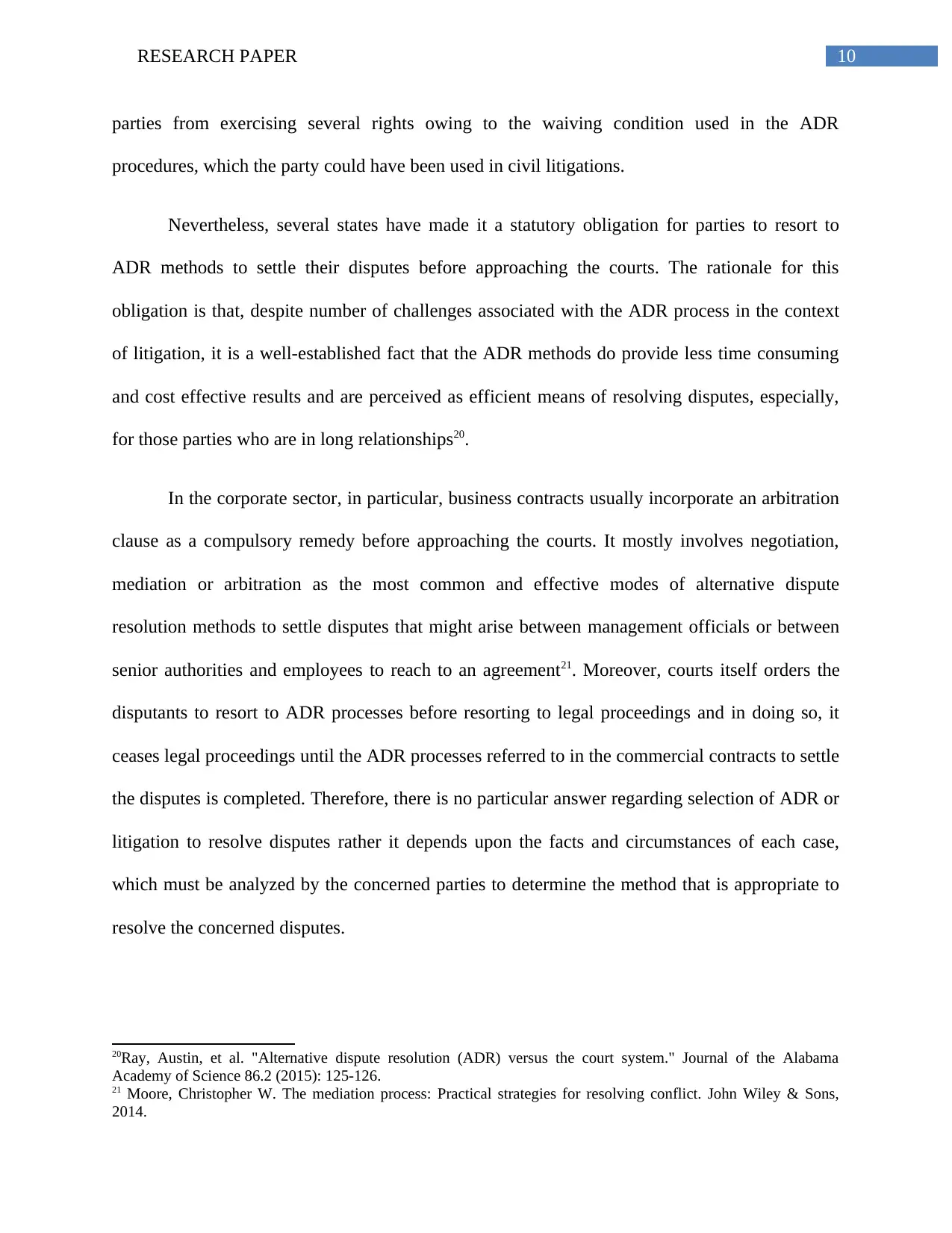
10RESEARCH PAPER
parties from exercising several rights owing to the waiving condition used in the ADR
procedures, which the party could have been used in civil litigations.
Nevertheless, several states have made it a statutory obligation for parties to resort to
ADR methods to settle their disputes before approaching the courts. The rationale for this
obligation is that, despite number of challenges associated with the ADR process in the context
of litigation, it is a well-established fact that the ADR methods do provide less time consuming
and cost effective results and are perceived as efficient means of resolving disputes, especially,
for those parties who are in long relationships20.
In the corporate sector, in particular, business contracts usually incorporate an arbitration
clause as a compulsory remedy before approaching the courts. It mostly involves negotiation,
mediation or arbitration as the most common and effective modes of alternative dispute
resolution methods to settle disputes that might arise between management officials or between
senior authorities and employees to reach to an agreement21. Moreover, courts itself orders the
disputants to resort to ADR processes before resorting to legal proceedings and in doing so, it
ceases legal proceedings until the ADR processes referred to in the commercial contracts to settle
the disputes is completed. Therefore, there is no particular answer regarding selection of ADR or
litigation to resolve disputes rather it depends upon the facts and circumstances of each case,
which must be analyzed by the concerned parties to determine the method that is appropriate to
resolve the concerned disputes.
20Ray, Austin, et al. "Alternative dispute resolution (ADR) versus the court system." Journal of the Alabama
Academy of Science 86.2 (2015): 125-126.
21 Moore, Christopher W. The mediation process: Practical strategies for resolving conflict. John Wiley & Sons,
2014.
parties from exercising several rights owing to the waiving condition used in the ADR
procedures, which the party could have been used in civil litigations.
Nevertheless, several states have made it a statutory obligation for parties to resort to
ADR methods to settle their disputes before approaching the courts. The rationale for this
obligation is that, despite number of challenges associated with the ADR process in the context
of litigation, it is a well-established fact that the ADR methods do provide less time consuming
and cost effective results and are perceived as efficient means of resolving disputes, especially,
for those parties who are in long relationships20.
In the corporate sector, in particular, business contracts usually incorporate an arbitration
clause as a compulsory remedy before approaching the courts. It mostly involves negotiation,
mediation or arbitration as the most common and effective modes of alternative dispute
resolution methods to settle disputes that might arise between management officials or between
senior authorities and employees to reach to an agreement21. Moreover, courts itself orders the
disputants to resort to ADR processes before resorting to legal proceedings and in doing so, it
ceases legal proceedings until the ADR processes referred to in the commercial contracts to settle
the disputes is completed. Therefore, there is no particular answer regarding selection of ADR or
litigation to resolve disputes rather it depends upon the facts and circumstances of each case,
which must be analyzed by the concerned parties to determine the method that is appropriate to
resolve the concerned disputes.
20Ray, Austin, et al. "Alternative dispute resolution (ADR) versus the court system." Journal of the Alabama
Academy of Science 86.2 (2015): 125-126.
21 Moore, Christopher W. The mediation process: Practical strategies for resolving conflict. John Wiley & Sons,
2014.
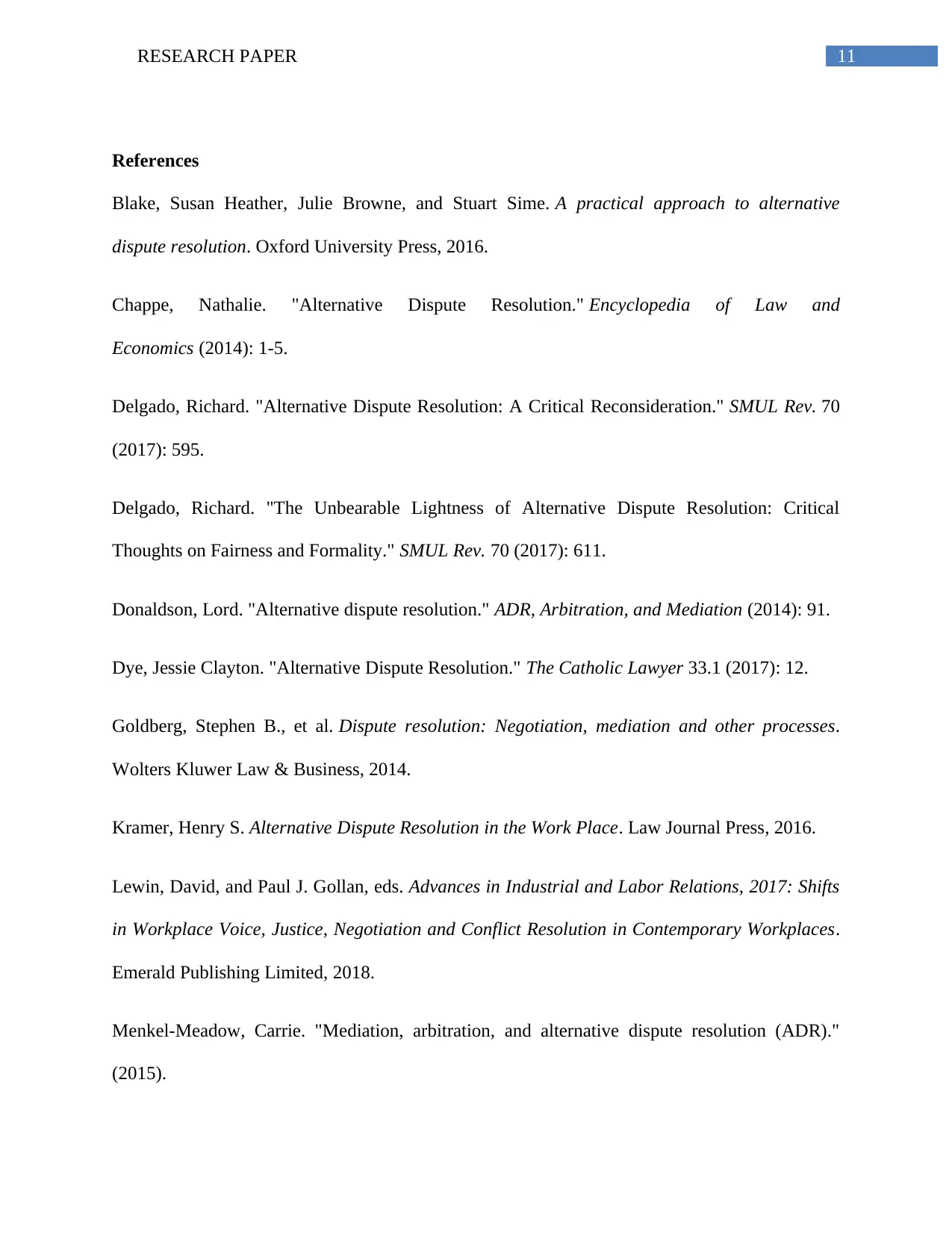
11RESEARCH PAPER
References
Blake, Susan Heather, Julie Browne, and Stuart Sime. A practical approach to alternative
dispute resolution. Oxford University Press, 2016.
Chappe, Nathalie. "Alternative Dispute Resolution." Encyclopedia of Law and
Economics (2014): 1-5.
Delgado, Richard. "Alternative Dispute Resolution: A Critical Reconsideration." SMUL Rev. 70
(2017): 595.
Delgado, Richard. "The Unbearable Lightness of Alternative Dispute Resolution: Critical
Thoughts on Fairness and Formality." SMUL Rev. 70 (2017): 611.
Donaldson, Lord. "Alternative dispute resolution." ADR, Arbitration, and Mediation (2014): 91.
Dye, Jessie Clayton. "Alternative Dispute Resolution." The Catholic Lawyer 33.1 (2017): 12.
Goldberg, Stephen B., et al. Dispute resolution: Negotiation, mediation and other processes.
Wolters Kluwer Law & Business, 2014.
Kramer, Henry S. Alternative Dispute Resolution in the Work Place. Law Journal Press, 2016.
Lewin, David, and Paul J. Gollan, eds. Advances in Industrial and Labor Relations, 2017: Shifts
in Workplace Voice, Justice, Negotiation and Conflict Resolution in Contemporary Workplaces.
Emerald Publishing Limited, 2018.
Menkel-Meadow, Carrie. "Mediation, arbitration, and alternative dispute resolution (ADR)."
(2015).
References
Blake, Susan Heather, Julie Browne, and Stuart Sime. A practical approach to alternative
dispute resolution. Oxford University Press, 2016.
Chappe, Nathalie. "Alternative Dispute Resolution." Encyclopedia of Law and
Economics (2014): 1-5.
Delgado, Richard. "Alternative Dispute Resolution: A Critical Reconsideration." SMUL Rev. 70
(2017): 595.
Delgado, Richard. "The Unbearable Lightness of Alternative Dispute Resolution: Critical
Thoughts on Fairness and Formality." SMUL Rev. 70 (2017): 611.
Donaldson, Lord. "Alternative dispute resolution." ADR, Arbitration, and Mediation (2014): 91.
Dye, Jessie Clayton. "Alternative Dispute Resolution." The Catholic Lawyer 33.1 (2017): 12.
Goldberg, Stephen B., et al. Dispute resolution: Negotiation, mediation and other processes.
Wolters Kluwer Law & Business, 2014.
Kramer, Henry S. Alternative Dispute Resolution in the Work Place. Law Journal Press, 2016.
Lewin, David, and Paul J. Gollan, eds. Advances in Industrial and Labor Relations, 2017: Shifts
in Workplace Voice, Justice, Negotiation and Conflict Resolution in Contemporary Workplaces.
Emerald Publishing Limited, 2018.
Menkel-Meadow, Carrie. "Mediation, arbitration, and alternative dispute resolution (ADR)."
(2015).
⊘ This is a preview!⊘
Do you want full access?
Subscribe today to unlock all pages.

Trusted by 1+ million students worldwide
1 out of 13
Related Documents
Your All-in-One AI-Powered Toolkit for Academic Success.
+13062052269
info@desklib.com
Available 24*7 on WhatsApp / Email
![[object Object]](/_next/static/media/star-bottom.7253800d.svg)
Unlock your academic potential
Copyright © 2020–2026 A2Z Services. All Rights Reserved. Developed and managed by ZUCOL.





